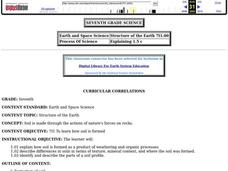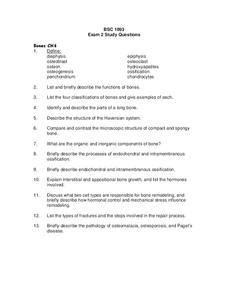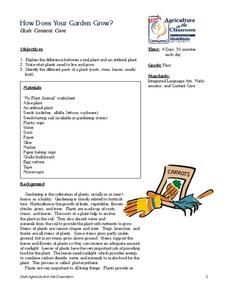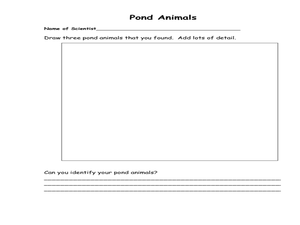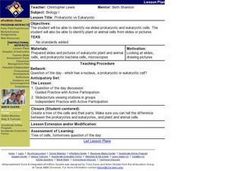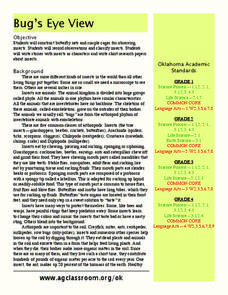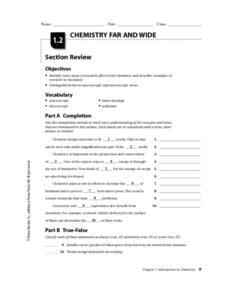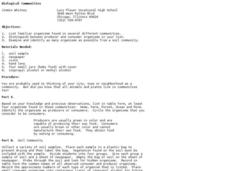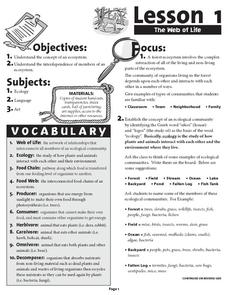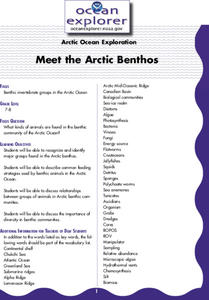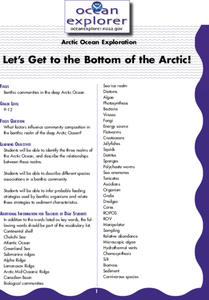Curated OER
An Introduction to 'Opae 'ula
Students examine the 'opae 'ula. In this science lesson, students observe a live specimen and identify the major body parts. Students construct habitat jars and observe the 'opae 'ula behaviors.
Curated OER
Soil Formation
Seventh graders investigate how soil is formed. They analyze types of soil samples, examine soil using a magnifying glass or microscope, complete a chart, conduct a soil and plant experiment, and construct a soil profile.
Curated OER
Bones
In this bones worksheet, young scholars list and describe the functions of bones and give examples for each. Then they compare and contrast the microscopic structure of compact and spongy bone. Students also list the types of fractures...
Curated OER
How Does Your Garden Grow?
Learners identify what plants need to grow. For this plant biology lesson, students analyze the differences between an artificial plant and a live plant. Learners plant seeds and discuss what plants need to grow. Students observe the...
Curated OER
Pond and Pond Organisms
Learners explore pond ecosystems. In this pond organism activity, students will use pond water and a plastic bad in order to locate and identify freshwater organisms. The activity is designed for younger grades, but...
Curated OER
Limu in Your Lunch
Students explore various types of algae found in Hawaii. In this science instructional activity, students research species of the three types of limu and identify various uses. Students explore products that contain limu.
Curated OER
Cell Factory
Students examine the basic structures and functions of cells. They design and construct a factory cell model where each factory part corresponds to a cell part.
Curated OER
Word Structure-Prefix and Suffix
Young scholars identify the common prefixes and suffixes used in the English language. They dissect a word into its various (root, prefix, suffix) parts and use a dictionary to determine the proper usage and derivation of each word...
Curated OER
Prokaryotic vs Eukaryotic
Students identify via slides prokaryotic and eukaryotic cells. They identify plant or animal cells from slides or pictures. Students are given the question of the day. They are asked which has a nucleus, a prokaryotic or eukaryotic...
Curated OER
Atoms
Eighth graders explain what makes up matter. In this atoms instructional activity students define an atom and what its components are and identify properties of elements.
Curated OER
Bug's Eye View
Students explore biology by writing fictitious stories in class. For this insect life lesson, students identify many different types of insects in the animal kingdom and the classifications they fall into. Students collect insects on a...
Curated OER
Science: Suddenly Snow
Students engage in snow-related activities during the first winter snowfall. After explaining the elements needed for it to snow, they preserve snowflakes on frozen slides and observe them under a microscope. Then, they write diamante...
Curated OER
Home Sweet Home
Students examine the animals that live in trees. They identify their sounds, footprints and droppings. They draw pictures of the animals as well.
Curated OER
Barn Owl Pellet Lab
In this lab worksheet, students dissect a barn owl pellet then identify the different small animals found in the owl pellet. Using class data they calculate percentage present as well as complete 8 post lab questions.
Curated OER
Sponges and Cnidarian Crossword Puzzle
In this marine science instructional activity, students complete a crossword puzzle with 32 questions on sponges and cnidarian. They identify the different characteristics of sponges and cnidarian.
Curated OER
Chemistry Far and Wide
In this chemistry worksheet, high schoolers fill in 10 blanks with the appropriate term, they determine if 4 statements are true or false, they match 6 terms with their definitions and they answer 3 questions. Topics include areas of...
Curated OER
Make and Use a Plankton Net
Students make simple plankton nets and use them to collect and identify common forms of plankton. They identify and interpret plankton, as seen under a microscope, whether there was more zooplankton or phytoplankton. Finally, students...
Curated OER
Cell Works
Students identify the different parts of the cells and their functions. In this biology lesson, students create an analogy of a cell and its organelles. They make a poster and present it to class.
Curated OER
Biological Communities
Students identify consumers and producers in different communities. Students collect a variety of soil samples and record organisms found in the samples.
Curated OER
The Web of Life
Students participate in a game in which they discover the balance of life in the ocean. They identify different organisms that rely on different types of food. They answer questions to complete the lesson.
Curated OER
Mountain Pine Beetle
Students identify the different parts of a tree. In this biology lesson, students investigate how mountain pine beetles kill trees. They examine the beetles' anatomy using a microscope.
Curated OER
Powdery Mildew Fungi: Classification and Ecology
Students use a written key or illustrated key to identify fungi on plant leaves into its genus based on sexual or asexual reproduction, host range diversity, and host-parasite relationships.
Curated OER
Meet the Arctic Benthos
Learners recognize and identify major groups found in the Arctic benthos. They describe common feeding strategies used by benthic animals in the Arctic Ocean. They discuss relationships between
Curated OER
Let's Get to the Bottom of the Arctic!
Students identify the three realms of the Arctic Ocean, and describe the relationships between these realms. They describe different species associations in a benthic community.



